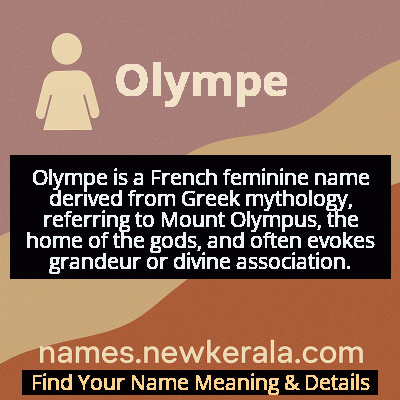Olympe Name Meaning & Details
Origin, Popularity, Numerology Analysis & Name Meaning of Olympe
Discover the origin, meaning, and cultural significance of the name OLYMPE. Delve into its historical roots and explore the lasting impact it has had on communities and traditions.
Name
Olympe
Gender
Female
Origin
French
Lucky Number
5
Meaning of the Name - Olympe
Olympe is a French feminine name derived from Greek mythology, referring to Mount Olympus, the home of the gods, and often evokes grandeur or divine association.
Olympe - Complete Numerology Analysis
Your Numerology Number
Based on Pythagorean Numerology System
Ruling Planet
Mercury
Positive Nature
Adventurous, dynamic, curious, and social.
Negative Traits
Restless, impatient, inconsistent, prone to indulgence.
Lucky Colours
Green, white.
Lucky Days
Wednesday.
Lucky Stones
Emerald.
Harmony Numbers
1, 3, 9.
Best Suited Professions
Sales, marketing, travel, entertainment.
What People Like About You
Versatility, charisma, adventurous spirit.
Famous People Named Olympe
Olympe de Gouges
Playwright and political activist
Pioneering feminist writer executed for her revolutionary ideals
Olympe Pélissier
Artist's muse and socialite
Inspired major artistic works and supported Rossini's later career
Olympe Audouard
Journalist and feminist
Founded multiple feminist publications in 19th century France
Name Variations & International Equivalents
Click on blue names to explore their detailed meanings. Gray names with will be available soon.
Cultural & Historical Significance
In French history, the name gained particular prominence during the Enlightenment and Revolutionary periods, most famously through Olympe de Gouges (1748-1793). Her courageous advocacy for women's rights and her execution during the Reign of Terror transformed the name into a symbol of feminist resistance and intellectual bravery. This historical association imbued Olympe with political and social significance that continues to resonate in modern feminist discourse. Throughout the 19th century, the name maintained its aristocratic and artistic connections, frequently appearing in literary works and among the cultured bourgeoisie as a marker of sophistication and progressive thinking.
Extended Personality Analysis
Individuals bearing the name Olympe are typically characterized by a combination of intellectual depth, strong principles, and creative vision. The name's mythological roots suggest a personality that aspires to greatness and operates on a grand scale of thinking. Olympes often demonstrate natural leadership qualities combined with a refined aesthetic sense and appreciation for beauty in all its forms. They tend to be independent, sometimes stubborn, in their convictions, with a strong moral compass that guides their decisions.
Historically influenced by figures like Olympe de Gouges, those named Olympe often exhibit strong social consciousness and a commitment to justice and equality. They're frequently drawn to careers that allow them to express their creativity while making a positive impact on society. While they can be intense and demanding of themselves and others, this stems from their high standards and visionary outlook. Olympes typically possess excellent communication skills and emotional intelligence, enabling them to inspire and lead others effectively. Their combination of classical wisdom and modern progressive thinking makes them particularly effective at bridging traditional and contemporary perspectives.
Modern Usage & Popularity
In contemporary naming practices, Olympe remains a distinctive and sophisticated choice that appeals to parents seeking a name with historical depth and intellectual credentials. While not among the most popular names in France or other French-speaking regions, it maintains a steady presence, particularly among educated urban families who value its unique character and feminist associations. The name's usage has seen a slight increase in recent years, possibly influenced by growing interest in historical female figures and vintage names with strong stories. Internationally, recognition of the name has been boosted by popular culture references, most notably the character Madame Olympe Maxime in the Harry Potter series. However, Olympe remains sufficiently rare to maintain its exclusive appeal, often chosen by parents who want a name that stands out while carrying substantial cultural and historical weight. Its modern usage reflects a preference for names that combine classical elegance with progressive values.
Symbolic & Spiritual Meanings
Symbolically, Olympe represents the aspiration toward excellence and the connection between human achievement and divine potential. The name's direct link to Mount Olympus evokes images of peak experiences, ultimate accomplishments, and the realm of gods and heroes. This gives Olympe strong connotations of ambition, mastery, and transcendence—suggesting someone who aims for the highest levels of achievement in their chosen field. The name also carries powerful feminist symbolism through its association with Olympe de Gouges, representing intellectual courage, advocacy for equality, and the willingness to challenge established power structures.
Metaphorically, Olympe suggests a bridge between ancient wisdom and modern progress, embodying the idea that classical ideals can inform contemporary social advancement. The name symbolizes the integration of strategic vision with practical action, and the courage to defend one's principles even in the face of opposition. In a broader sense, Olympe represents the human capacity for greatness and the ongoing struggle for justice and equality—themes that remain deeply relevant in modern society. The name's symbolic richness makes it particularly meaningful for those who value both historical consciousness and forward-thinking values.

